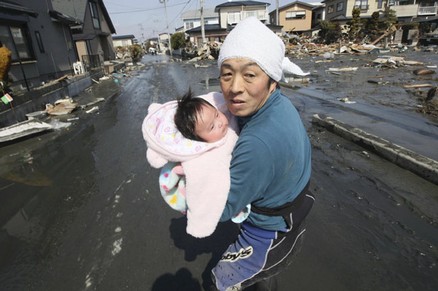Pulled from the rubble of Japan... baby who survived the tsunami

Upon hearing another tsunami warning, a father tries to flee for safety with his just reunited four-month-old baby girl who was spotted by Japan's Self-Defense Force member in the rubble of tsunami-torn Ishinomaki Monday, March 14, 2011, three days after a powerful earthquake-triggered tsunami hit northeast Japan.
A four-month-old baby was dragged out of the rubble by rescue workers in the Japanese city of Ishinomaki yesterday.
The girl, who was not named by the authorities, was found by Japan's Self-Defence Force.
Wrapped in a pink woollen bear suit, the little girl was kept alive by her parents amid what remained of their home.
The mood of optimism provoked by her rescue did not last for long, however.
Moments later an aftershock hit the town, prompting a new tsunami warning and sending the town's remaining residents scrambling to find higher ground.
Fortunately, the warning turned out to be a false alarm.
Half of the town of 165,000 is estimated to have been engulfed by the tsunami which followed Friday's earthquake.
The survivors have been left without power and water in sub-zero conditions.
Groups of people, many of them elderly, were yesterday huddled around campfires, wrapped in blankets in what were once streets, as they waited to be rescued.
But as rescue workers from around the world began to reach the worst affected areas tales of survival became rarer and rarer.
People living on the coast spoke of how they ran from the huge tsunami wave that destroyed their communities.
“I thought I was going to die,” said Wataru Fujimura (38), a sales representative in the badly hit city of Koriyama.
“Our furniture and shelves had all fallen over and there were cracks in the apartment building, so we spent the night in the car. Now we're back home trying to clean.”
Kumi Onodera (34), from Sendai, another of the badly damaged cities along Japan's north-eastern coastline, described the roads “moving up and down like a wave”. “You really come to appreciate what you have in your everyday life. Everything is so hard now,” she said.
Another person from Sendai, truck driver Koichi Takairin (34) told of how he survived by sitting in his truck as the waters caused devastation.
“The tsunami was unbelievably fast; smaller cars were being swept around me,” he said.
Although Tokyo has been largely untouched by the disaster, Graeme Melvin, a 28-year-old teacher from Edinburgh who works in Japan's capital, described the effects the earthquake had on his office and his disbelief that no one in his office had been hurt.
“Computers were falling off desks, chairs were being thrown over,” he said. “As we made it outside into the huge car park, we turned to see the building moving from side to side, with the glass windows rattling as if being pounded by hurricane winds.”
However, despite the devastation and continued threat of radiation, as well as ongoing tremors, many voices reinforce the Japanese Prime Minister Naoto Kan's determined assertions that Japan will get through this disaster — with help from friends.
“Somehow, we can hang in there, I hope,” said Yasue Schumaker, visiting her mother in Tohoku University Hospital in Sendai. “We don't have any electric, water, gas — but please, help the people who lost their homes and the people on top of the buildings asking for help.
“We need foreign countries' help. We're in an emergency, please help us.”


 Pages: 1
Pages: 1
 Pages: 1
Pages: 1
 Home
Home




